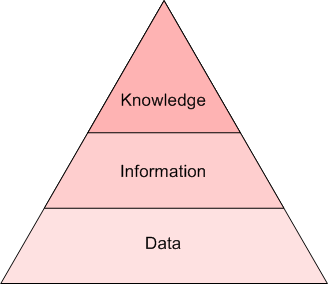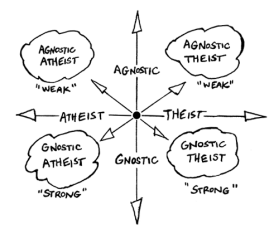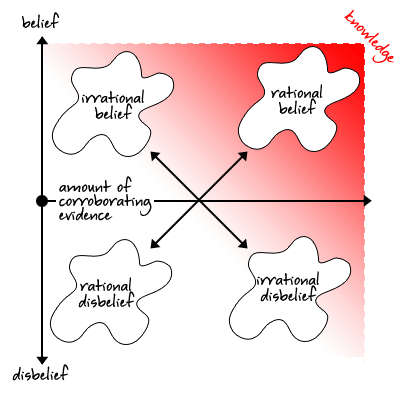Knowledge is based on evidence whereas belief does not need any evidence.
I think the "Knowledge hierarchy" is interesting in this case:

So let's get through it:
Data is only symbols / signs. Data comes from sensors. A simple example is the output stream a visual sensor produces. This sensor might be your eye and the data comes in the form of electrical impulses.
Information is data with context and interpretation. In the eye example that could be some structure: Your brain knows that the data it gets is grouped. What arrives at the same time is related; things that are closer together are related. From the different signals of single rod cells an image is formed.
So information can only exist with data, but it is more.
I would define knowledge as an extrapolation of information. So you try find patterns in information with context. In the eye example I would say that knowledge is the following: You see the following image:

Source: https://commons.wikimedia.org/wiki/File:Puppy.JPG
But without knowledge that has no further meaning. But you have seen that pattern before. And you have seen the pattern what happens next before:
- People say sweet
- You feel happy
- You're tempted to +1 this post ( :-) )
You got this knowledge by combining lots and lots of information:
- You have seen the pattern "fur", "eyes", "mouth" before
- You have seen the combination before
- In your first years you were told many times "that's a dog"
so you derived that "dog" is what these patterns mean. And as you know these patterns, you have compresses a lot of information and even more data: You can predict what can happen and what can't. Your predictions might not be always right, but they have to be right most of the time. How do you know they are right? Well, that's another question.
One questions that I think is interesting is:
Is knowledge always correct?
Well, I think here you will get problems with terms. I would call one of them universal knowledge and the other personal knowledge. The universal knowledge does fit to every information all the time. In that sense it cannot be wrong. But it is rather a theoretical construct.
We only have personal knowledge as we only have limited data and therefore limited information. As our capacities to detect patterns are limited we also accept errors. So our knowledge has not to fit all information we get. We sometimes simply ignore information (Was that fish just talking? Nah, I have never seen that before. Let's ignore it.) or we actively try to get more information (Did the fish talk again? Probably somebody tried to fool me. Lets seek for hidden cameras.)
Humans have developed amazing abilities to get and share knowledge.
A good strategy for checking if knowledge is useful / valid is falsification. For everything you know, there has to be some information that had the possibility to change your mind: "If XY happens, then my knowledge about Z is wrong.".
So much about knowledge. But what is belief?
Belief does not need any data / information / knowledge. When you ask religious people what you could do that would make them not belief in god any longer, you will get one answer: Nothing. No data / information can "remove" belief.
Colloquial meaning: I belief
Sometimes people say I belief when they are not sure about something. But that's something different.




